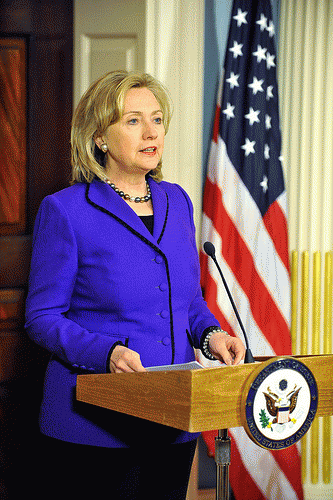by Walter Brasch
Three weeks before the Democratic National Convention in Philadelphia, Hillary Rodham Clinton unloaded heavy baggage.
In an extremely rare news conference, FBI director James Comey summarized the conclusions of a seven month FBI investigation into Clinton's use of a personal email rather than more secure governmental servers during her four years as secretary of state.
Clinton's role in the attack upon the U.S. consulate in Benghazi, Libya, that left four dead in September 2012, had been a major campaign issue. Conservatives and 16 major Republican candidates for the Republican nomination for president had used what they said was her slow defense of the consulate to attack her. However, several investigations by Congressional committees, chaired by Republicans, found no culpability on Clinton's part. The cost is about $7 million.
Unable to gain significant traction, the conservatives looked for another possible scandal, and found it with her use of personal email to conduct government business. For more than a year, they have hammered on this scandal. Their hope had been to pull votes from Clinton to Bernie Sanders, believing that Sanders, if nominated, was the weaker opposition to the final few Republican candidates. What has resulted is a debt incurred by taxpayers that is at least $20 million for the investigation, according to the Fiscal Times.
Clinton hurt her campaign by delayed response to the allegations she compromised national security and then by dodging and weaving on her public comments, allowing the scandal to fester and explode. The conservatives got additional ammunition when a meeting between Bill Clinton and Attorney General Lynch fell into their laps. Both claim the meeting in Phoenix was accidental, and the main topic was grandchildren. The conservatives pounced on that; even liberals, moderates, and independents thought it was inappropriate for the attorney general who might become the prosecutor to be chatting with the husband of the presumptive nominee for president who was the target of a federal investigation. Both Lynch and the 42nd president, who met on the attorney general's government aircraft, later acknowledged they should not have met, even if the only conversation was social.
In front of news cameras and the press, Comey revealed that from more than 30,000 emails the FBI read, sorted, and analyzed, "110 e-mails in 52 e-mail chains have been determined by the owning agency to contain classified information at the time they were sent or received." Eight chains, said Comey, contained top secret information; 36 contained secret information; and eight contain confidential information. About 2,000 e-mails were later "up-classified." The FBI also interrogated numerous individuals who had knowledge of, and access to, the e-mails. There was no hacking of Clinton's server, no leaks of e-mail content, and no evidence of any deletion of the e-mails by Clinton or anyone else, said Comey. Based upon federal laws, the FBI determined, "our judgment is that no reasonable prosecutor would bring such a case [into court]." This past week, Attorney General Loretta Lynch announced that the Department of Justice would not pursue felony charges against Clinton.
However, Clinton didn't skate free. Comey pointed out that Clinton and the Department of State were "extremely careless in their handling of very sensitive, highly classified information," that "there is evidence to support a conclusion that any reasonable person in Secretary Clinton's position, or in the position of those government employees with whom she was corresponding about these matters, should have known that an unclassified system was no place for that conversation," and that "none of these e-mails should have been on any kind of unclassified system, but their presence is especially concerning because all of these e-mails were housed on unclassified personal servers not even supported by full-time security staff, like those found at Departments and Agencies of the U.S. Government--or even with a commercial service like Gmail."
(Note: You can view every article as one long page if you sign up as an Advocate Member, or higher).





